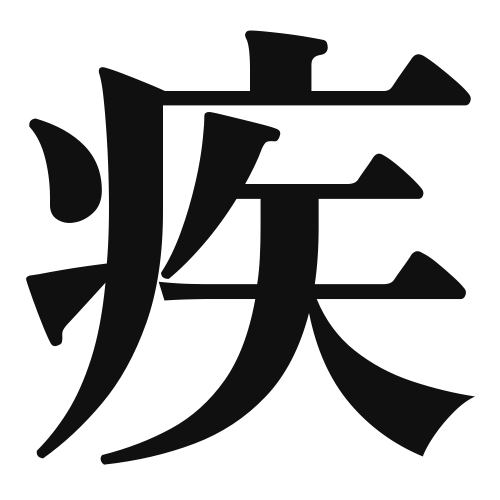1. Overview of Meaning
The kanji “疾” (shitsu) primarily means “sickness” or “disease.” It conveys a sense of rapidity or urgency, often associated with health issues or ailments.
2. Formation and Radical
Formation of the Kanji: The kanji “疾” is a phonetic compound (形声文字), which combines a semantic component that relates to speed or urgency with a phonetic element that suggests its pronunciation.
Radical: The radical for “疾” is “疒” (ne), which is related to sickness or disease, indicating its connection to health-related concepts.
3. Examples of Usage
Common Words and Phrases: Some frequently used words that include “疾” are “疾患” (shikkan – illness) and “疾風” (shippuu – swift wind).
Example Sentences in Daily Conversation:
- 彼は最近、重い疾患にかかっています。(Kare wa saikin, omoi shikkan ni kakatteimasu.) – He has been suffering from a serious illness recently.
- 疾風のように走ることができる。(Shippuu no you ni hashiru koto ga dekiru.) – I can run like the swift wind.
4. Synonyms and Antonyms
Similar Kanji: A similar kanji is “病” (byou), which also means “illness” but is more commonly used in everyday contexts. “疾” tends to imply a more acute or urgent condition.
Opposite Kanji: An antonym is “健” (ken), which means “healthy” or “fit,” representing the opposite of sickness.
5. Cultural and Historical Background
Relation to Japanese Culture: The concept of “疾” is significant in traditional Japanese medicine and health practices, where understanding the urgency of ailments is crucial for treatment.
Proverbs and Idioms: One relevant proverb is “疾風に勁草を知る” (Shippuu ni keisou wo shiru), which translates to “You know the strength of the grass in a swift wind,” emphasizing how challenges reveal true character.
